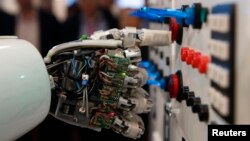In view of the recent warnings from researchers and entrepreneurs that artificial intelligence, or AI, may become too smart, major players in the technology field are thinking about the methods for preserving human control.
Famed theoretical physicist Stephen Hawking and entrepreneurs Elon Musk of Tesla Motors and Microsoft co-founder Bill Gates all say that AI is rapidly approaching the point of self-awareness. As Hawking said in a 2014 interview, the slow biological evolution of humans cannot compete with the speed of artificial intelligence development.
In a scientific paper titled "Safely Interruptible Agents," Laurent Orseau, director of Google's DeepMind, and Stuart Armstrong, a University of Oxford professor, say humans should have what they call a “big red button” available if the artificial intelligence attempts to escape control.
Scientists say that, in the real world, it is hard to expect artificial intelligence to make optimal decisions all the time, so humans should be able to prevent actions that could lead to harmful consequences.
Researchers also say it is equally important to prevent artificial intelligence from learning how to disable the so-called "kill switch."
Speaking at the recent Code Conference in California, entrepreneur Musk proposed a different idea. If everybody had a neural connection with artificial intelligence, he said, the collective will of other actors would prevent individuals or machines from doing something bad.




